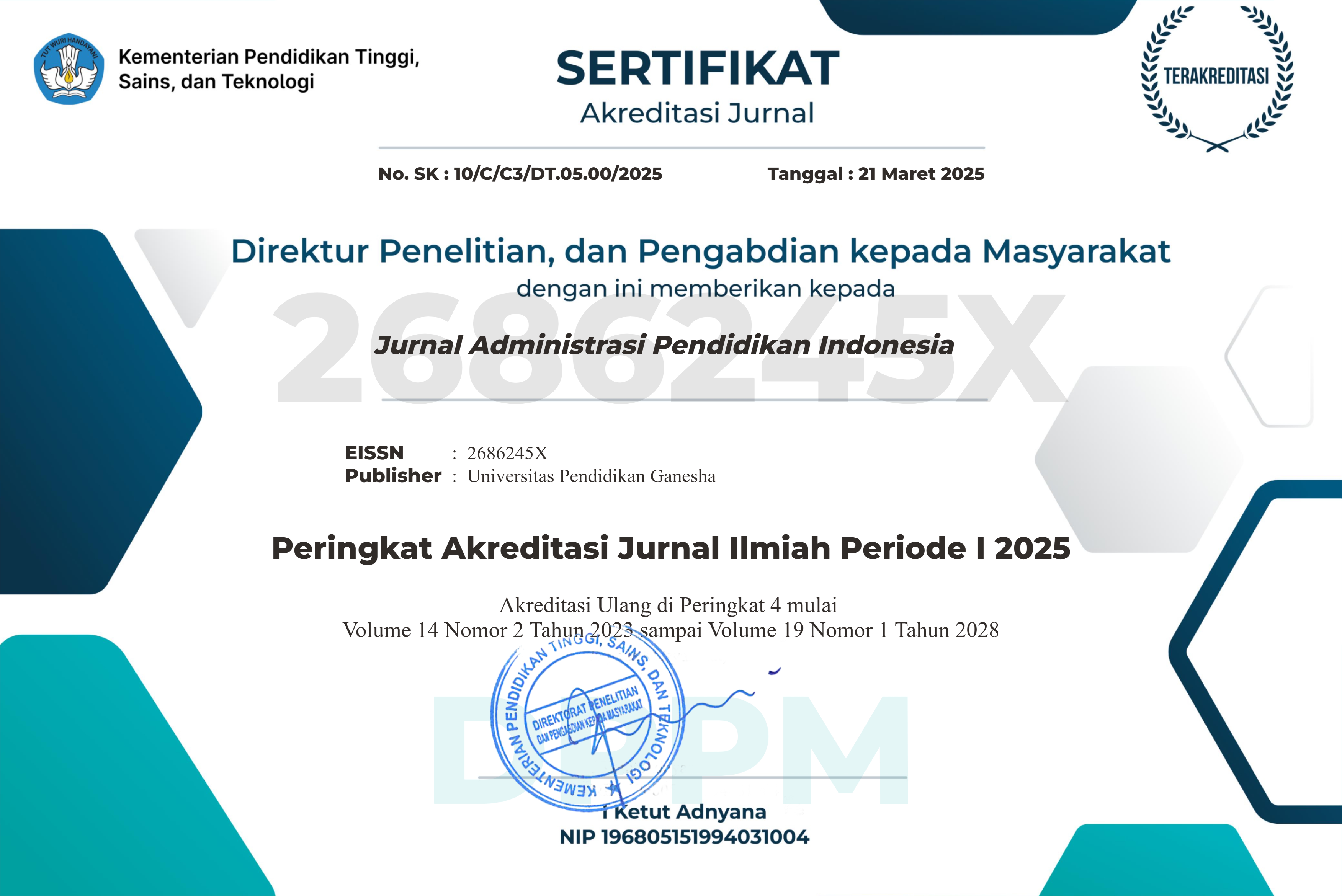Evaluation of the Equivalency Nonphysical DAK Utilization System in 2021 in the Nonformal Education Unit of Jembrana Regency
DOI:
https://doi.org/10.23887/jurnal_ap.v13i2.1742Keywords:
evaluation, DAK system, CIPPAbstract
This study aims to 1) find out the effectiveness of the system for using non-physical equivalent DAK for the 2021 fiscal year in Jembrana district non-formal education units in terms of the context component; 2) determine the effectiveness of the DAK utilization system in terms of input components; 3) determine the effectiveness of the DAK utilization system in terms of process components; 4) determine the effectiveness of the DAK utilization system in terms of product components; 5) determine the effectiveness of the system for using DAK together in context, input, process, product; and 6) find out the constraints in the non-physical equivalent DAK utilization system for the 2021 fiscal year in Jembrana district non-formal education units. The research was conducted at the Jembrana District Non-Formal Education Unit. This study uses a quantitative approach, this study uses an evaluation research design. The population in this study were all teaching and educational staff, totaling 20 people. The research sample was determined using a saturated sampling technique, namely the entire population. Data were collected using questionnaires, documentation, and interviews. Data analysis was performed by converting the raw score into a Z score (z-score) followed by a T score and then converted into the Glickman quadrant. The results of the study show the effectiveness of the non-physical Equivalent DAK utilization system for the 2021 fiscal year in Jembrana district non-formal education units in terms of context, the results obtained are less effective (-), the effectiveness of the DAK utilization system in terms of input, the effective results are obtained (+), the effectiveness of the DAK utilization system in terms of process effective results (+) were obtained, the effectiveness of the DAK utilization system in terms of a product obtained effective results (+). Overall, the evaluation of the context, input, process, and product variables in the DAK utilization system is classified as effective ( - + + +).
References
Perturan Menteri Pendidikan dan Kebudayaan Republik Indonesia Nomor 9 Tahun 2021 Tentang Petunjuk Teknis Pengelolaan Dana Bantuan Operasioanal Penyelenggaraan Pendidikan Anak Usia Dini Dan Operasional Penyelenggaraan Pendidikan Kesetaraan, Pub. L. No. 9 (2021).
Ningsih, E. S. (2017). Evaluasi Program Paket C Di Pkbm Delima Kecamatan Tugumulyo Kabupaten Musi Rawas Evaluation Program Of Package C In The Center Of Learning Activities ( Pkbm ) Delima In Tugumulyo District , Musi Rawas Regency. Jurnal Penelitian Dan Penilaian Pendidikan, 2(2), 224–241. https://doi.org/10.22236/JPPP
Purwanto. (2011). Evaluasi Hasil Belajar. Pustaka Pelajar.
Stufflebeam, D. L., & Zhang, G. (2017). The CIPP Evaluation Model How to Evaluate for Improvement and Accountability. The Guilford Press.
Sudijono, A. (2011). Evaluasi Pedidikan. Raja Grafindo Persada.
Sumeyasa, I. N. (n.d.). Evaluasi Pelaksanaan Sistem Penjaminan Mutu Internal (Spmi) Di Sekolah Model Kabupaten Tabanan (Studi Kasus di SMP Negeri 1 Penebel). Jurnal Administrasi Pendidikan Indonesia, 11(2), 1–12. https://doi.org/10.23887/japi.v11i2.3409
Suryana, & Alma, N. (2018). Evaluasi Program Pendidikan Anak Usia Dini (PAUD) di PKBM Danis Jaya Kota Tasikmalaya. Jurnal Cendekiawan Ilmiah PLS, 3(1), 12–21. https://doi.org/10.37058/jpls.v3i1.1613
Sutrisna, Y. (2021). Evaluasi Pelaksanaan Penggunaan Bantuan Operasional Sekolah Daerah Tahun Anggaran 2020 Dengan Model CIPP (Studi Kasus Pada SMK Negeri Se-Kota Denpasar). E-Journal Undiksha, 2(1), 1–16. https://repo.undiksha.ac.id/7964/
Tamsir. (2020). Efektivitas Pengelolaan Anggaran Pada Pusat Kegiatan Belajar Masyarakat (PKMB) Taman Pendidikan di Kelurahan Tapa Kecamatan Sipatana Gorontalo. Jurnal AkMen, 17(3), 21–31. https://e-jurnal.nobel.ac.id/index.php/akmen/article/view/1009











